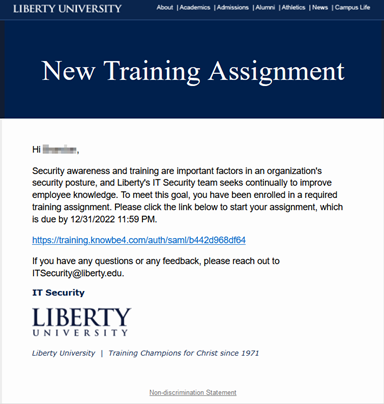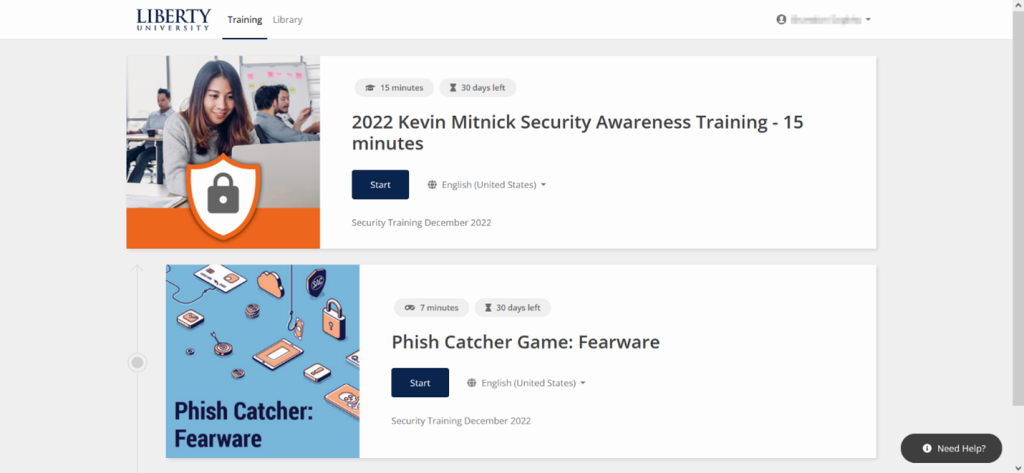
KnowBe4 is the world’s first and largest school security awareness training and simulated phishing platform that helps manage the ongoing problem of social engineering. Social engineering is the art of manipulating, influencing, or deceiving you to gain control over your computer system. KnowBe4’s goal is to help users navigate cyber threats through user awareness and training.
Liberty University’s IT Security team has partnered with KnowBe4 to deliver training to our staff members. There will be a minimum of one training campaign annually, with additional campaigns based on the university’s needs or by department request.
In addition to the information security training, KnowBe4 also provides the ability to send simulated phishing emails, allowing us to safely test the knowledge of handling suspicious emails among the LU population and create more tailored security training to fit the University’s needs. To learn more on how to handle suspicious emails, check out our phishing webpage with helpful tips on handling these items.
Accessing KnowBe4 Training
When you have been assigned a training task to complete, you will receive an automated email from IT Security through KnowBe4. This email will provide the due date of the assignment and a link to the training portal. Using the provided link will grant you access to your training without needing to sign in. If you are asked to provide credentials to KnowBe4, please contact IT Security and they will review your account.

After accessing your training portal, all assigned modules will be presented on the home page. Work through each module to complete your assignments. Once everything has been completed, the portal will reflect that you no longer have any trainings assigned.

If you would like to access your training profile without an email from KnowBe4, follow the link below:
Frequently Asked Questions
Who is getting access to this training?
KnowBe4 Training is currently only available to Liberty Staff members.
Is the KnowBe4 training email real or a phishing attack?
IT Security does not send out simulated phishing attempts disguised as training emails. If you believe that you have received a suspicious email, please review the tips and tricks to avoid phishing scams at www.Liberty.edu/Phishing.
Is KnowBe4 Training required?
The training assigned by IT Security is required and must be completed by the deadline given in the training email.
Why can I not sign into KnowBe4 with my Liberty University username and password?
You should not have to supply credentials to access KnowBe4 training material. If you are prompted to supply a username and password when you click the training link, this most likely means an adjustment needs to be made to your KnowBe4 profile. Should you find yourself in this situation, please email itsecurity@liberty.edu and we will investigate the problem with your account.
If you are accessing the training portal without an email link, you will need to provide your Liberty University email address. Then, you will be redirected to complete the sign-in through LU’s sign-in page.
Is there a penalty for not completing the assigned training?
At this time, the penalty for not completing assigned training is at the discretion of your department leadership. This is subject to change in the future.
Is IT Security sending me targeted phishing emails?
There may be times throughout the year that IT Security will conduct a simulated phishing campaign to test our staff members. This is a controlled test with no threat to a user’s information. Any text entered in a simulated-phishing website cannot be viewed. IT Security uses this data to create and improve the training materials provided during training campaigns.
How will I be tested?
Currently, only email testing (phishing) is conducted.
What happens if I fail a simulated phishing test?
At this time, there is no penalty for failing a simulated phishing test, but you may be enrolled in additional training. The results will be shared with department leadership. Penalties for failing the simulated phishing test may change in the future.